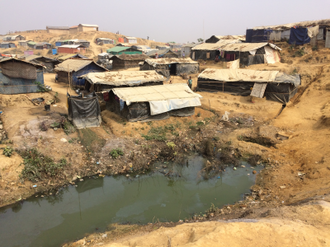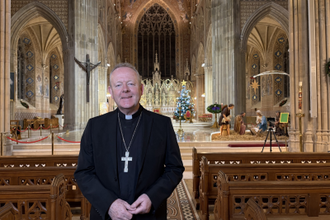Bangladesh: CAFOD warns monsoon rains could cause catastrophe for Rohingya refugees

Refugee camps in Cox's Bazar are at high risk from flooding and landslides - image CAFOD
Having fled violence, tens of thousands of Rohingya refugees living in camps in Cox's Bazar face great risks from the upcoming monsoon season, due to start in a matter of weeks.
"The refugees are living in precarious conditions. Their shelters are on hillsides which will turn to mud when the heavy rains arrive," said Zoë Corden, CAFOD's Emergency Response Officer, who is in Cox's Bazar supporting the emergency response. If the rains are heavy people will be killed from flooding, landslides and from contaminated water sources. A cyclone would be devastating.
"Many Rohingya are not from cyclone affected areas and therefore have no experience of this type of weather event and how to cope. With such large numbers of people, it is not feasible to evacuate them elsewhere or build cyclone shelters."
CAFOD and its local partner, Caritas Bangladesh, are working around the clock, ramping up efforts to protect vulnerable families. Working with around 3,500 local aid workers across the country, Caritas Bangladesh are experienced and well-placed to respond to this emergency and a possible cyclone.
Francis Atul Sarker, Director of Caritas Bangladesh, said: "The monsoon season is our greatest concern. As far as the horizon you can see settlements on hilltops and hillsides, people are in danger if heavier than usual rains lead to massive floods and landslides. We are already planning ahead using technology to map where flood waters might run; having in place a rescue plan, and doing what we can to reinforce people's temporary shelters."
There is concern that the camps are already struggling with inadequate sanitation and poor hygiene conditions, which will be exacerbated by heavier than usual rains, which could lead to the outbreak of diseases.
"Drainage is also a massive problem" said Zoë Corden. "In many cases it was either not put in place, or only set up for the short term. Caritas Bangladesh is helping the refugees to plan site improvements, including digging drainage, placing sandbags, and building foot bridges".
The crisis continues. Six months on, more than 680,000 mainly Rohingya people have fled violence in Myanmar since 25 August 2017.
"The future is uncertain for the refugees. A group of young women I spoke to in Cox's Bazar said they would rather die than go back," said Zoë Corden.
Repatriation plans agreed by the Myanmar and Bangladesh Governments have been delayed. Sarker says that any plans for repatriation must be done with all the right guarantees in place and involving mandated UN bodies.
"Currently there are still people fleeing Myanmar and arriving in Bangladesh, and no refugee who is still in fear of their life should be required to return. Despite very difficult and cramped conditions in the camps in Cox's Bazar, many Rohingya refugees would still prefer to stay than risk their lives. Any repatriation must therefore be safe and voluntary.
"The issue of safety must be addressed, as well as guarantees that families would be supported to rebuild their homes and lives. This requires further agreement on the refugees' status in Myanmar, and assurances that there are clear mechanisms in place to help ensure safe returns and protection on their return."
Sarker concluded by thanking CAFOD supporters and the UK public for making a difference to the lives of people in great need.
"Our thanks and gratitude go out to CAFOD supporters and the UK public, who saw the suffering in Cox's Bazar, and were moved to do something through prayer and donations.
"With CAFOD's support we have been able to reach over 11,000 households with vital humanitarian aid, that is more than 48,000 people who have received lentils, cooking oil, sugar and salt - 12,000 of whom also received kitchen supplies - and a further 6,750 people who have received winter kits; blankets, warm clothing and sleeping mats. Over the coming months we will reach thousands more with your support."
CAFOD works with communities across Africa, Asia and Latin America to fight poverty and injustice. The agency works with people in need regardless of race, gender, religion or nationality. CAFOD is part of Caritas International, the second largest humanitarian network in the world, with more than 160 members.Photo 1: Caritas Bangladesh have built drainage systems to reduce the risk of flooding in refugee camps in Cox's Bazar. Photo credit: CAFOD
Photo 2: Refugee camps in Cox's Bazar are at high risk from flooding and landslides. Photo credit: CAFOD


















